The world after Trump: What undermined the status quo ante?
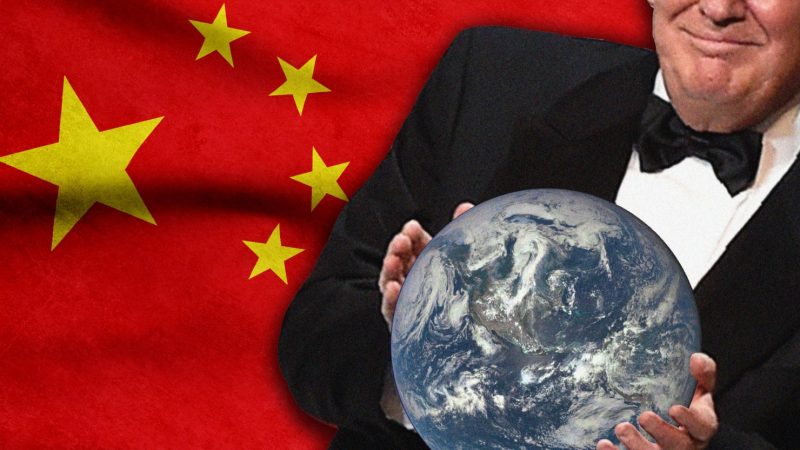
If we first look at the number of driving forces, there are a large number, and although some are well known and clear, others are more obscure and less well understood:
Society: growing real and perceived inequality
It seems that in most countries, the gap between extremely rich and poor has been growing in the last decades[3], and a body of knowledge suggests that this is not just by accident, but it is a logical consequence of a capitalist system when not faced with any major shocks (e.g. a war)[4]. Capital accrues fastest to those who already have capital, and they gradually draw ahead. Oddly, in the European context, the very success of the EU in terms of peace and stability may have accidently reinforced inequality.
That of itself would not be such a problem, if those at the poorer end felt they could, by their own labours, be it work or study, get up the greasy pole themselves. But the “American Dream” has lost a lot of its lustre[5], as has social mobility elsewhere in the developed world. Unlike in the 1960s, when a large new middle class emerged (something that encouraged a sense of societal progress), the perception is now increasingly widespread, that if you are born in a poor family, you are stuck there[6].
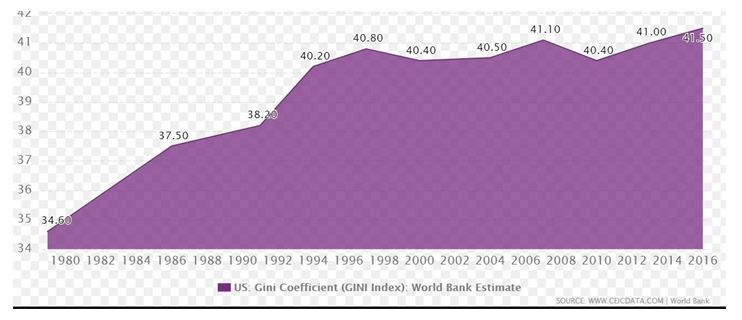
Figure 1 – Gini index (inequalities) in the US, 1979-2016. Source: World Bank.
Globalisation: more than economics
Whilst much discussion on globalisation focuses on trade and investment across borders, in reality these phenomena are not totally new, even if they were once hidden within colonial-mother country boundaries. The novelty in globalisation in the last 50 years has been the instantaneous spread of information around the globe.
Combine this with the vast inequality that exists between poorer and richer countries. Suddenly it is possible for the poor to see just how life is better elsewhere at the flick of a TV switch, or at the click on a phone. And some, who have enough funds to pay for a passage, will then take the risk of trying to move to a rich country, driving a perception that mass migration is taking place[7].
Financial flows also have been largely freed of their bonds to geography, with hot money flowing across borders, helping some of the ultra-rich and large corporates avoid paying tax as a small side effect. It also means that when a financial instrument in one country causes a crisis, or brings down a bank like Lehmann Brothers, the problem is instantly a global one[8].
Politics: parties and institutions are dying on their feet
Political parties used to be the vehicles by which political discontent was channelled through ideologies with a view to creating a particular vision of society. In the best of cases, they had members anchored in their local societies, such as trade unions, religious associations, enterprises and civil society. The end of the Soviet Union effectively destroyed the ideological basis of most existing parties in Western Europe. Being for or against socialism no longer had so much attractive force, as the serious version – complete expropriation of private ownership – had proven to be a failure and the parties now left over seem simply to offer variations of the same thing; some sort of state intervention in the market, but no real alternative vision.
Moreover, other institutions have lost their importance in society. Trade unions and traditional churches tend to be in decline, as they simply cannot adapt fast enough to the rapid changes in society around them. Members of political parties thus tend to have become detached from society and the general public increasingly perceives them as clubs of individuals whose only goal is to seize power for their own benefit. In some cases, this has also reinforced a tendency towards “revolving door politicians” who jump in and out of politics – on the positive side, bringing in skills from the outside; on the negative side, risking that they represent corporate lobbies or have very short-term views of what to achieve[9].
Technology: dream and dystopia
The substitute for political vision that has emerged is technology. The most important visionaries today tend to be Steve Jobs clones and film makers who show how shiny new technologies can offer us the ability to do things we could not do before. Those promoting them offer amazing possibilities – to access knowledge from anywhere, to conquer disease, even to live for a thousand years[10]…
These visions, however, also leave many people cold. The same technology that tells us how to get to our destination, is also telling others all about our habits – and could easily be used to create a Chinese social credit rating system that bans those with antisocial views from buying train tickets (and that is one of the more harmless possible outcomes). Even the same social media we use to communicate with friends is used by extremists (and Russian bots!) to find fellow-travellers and spread poison or misinformation. And the same high-yield, pest-resistant form of plant that feeds me, may actually be causing the mass death of the insects we need for pollination. It is no surprise therefore, that visions of technology as a solution, are seen by many voters as unattractive at best, or an expression of hubris as we create the Anthropocene[11].
Economy: classical capitalism undermined
The currently prevalent Ricardian economic theory[12] posits that trade benefits both parties, including the weaker party, by allowing each to specialise. But one important assumption he made was that finance is not mobile. As mentioned, this is often no longer the case. Despite this, we can see that cross-border trade has created global supply chains which have spread wealth to many previously poor countries. This can be seen as a triumph of Ricardian theory, with wealth being distributed as ‘just-in-time’ production has also taken off. However, there is a slow realisation that this emphasis on economic efficiency undermines resilience. In the face of a major shock, an Extreme Event (X-Events), a Black Swan[13] or whatever you wish to call it, a supply chain may well collapse. In a not too serious variant of this, a tsunami in Japan can cause factories in the US and Germany to stop working[14]. But as X-Events seem to be ever more frequent, the limits of putting short term efficiency above long term resilience has to be questioned.
Although not expressed in terms of resilience, but in terms of jobs, President Trump’s yearning for national autarchy is visible and an excuse he can use when claiming that production of steel in the USA is a question of national security[15].
Geo-politics: The rise of China
On top of this, in another part of our prevalent economic theory, Adam Smith affirmed that, in order for his ‘hidden hand’ to work, there needed to be a relative consensus on values between those who are trading. This basic commonality of views could have been claimed when trade was largely confined to the ‘West’. After all, at the time of the Cold War, there was relatively little trade with the Soviet bloc and the rest of the world remained of marginal importance. But with the rise of China and other emerging markets, the consensus on values is not so obvious. If the goods we import are made by workers who are paid a pittance, it seems that Adam Smith’s conditions on common values are not met.
In any case, it can no longer be assumed that Western values will triumph in a globalised world, which again makes Western voters apprehensive of globalisation. In answer, it could be said that there is a good side and a bad side to this, as the universality of human rights would be a boon if applied in many countries, but the spread of the wrong form of capitalism could likely lead to ecological disaster.
Moreover, it is clear that China, Russia and India – and likely later other nations too – are not just going to accept US (or Western) leadership in the world. China is no longer keeping the low profile that Deng Xiaoping once advocated. The Olympic Games in Beijing was the moment when China decided that it should now return to its traditional place as being a centre of the world[16]. And, certainly, these other players do not perceive the US as balanced judge or generous donor. Unsurprisingly, given that such global powers tend to see international interaction as a zero-sum game, Americans now see it this way too, with President Trump simply echoing this Welt Anschauung[17] (world view).
Ecology: bumping into planetary limits
Our economic models are also fundamentally deficient in the way they measure ‘progress’. Clear-cutting a pristine forest and selling all the wood to make furniture, houses and paper counts as economic growth, adding to the GDP. The fact that it has (possibly permanently) eliminated a natural resource that offered countless other ecological services necessary for animal (including human) life is not measured. After all, economics measures flows, not stocks.
But every year humanity ‘overconsumes’ the resources that can be sustainably provided from the stock available[18]. Hence, at some point, a tipping point will likely be reached, be this on fresh water, clean air or food available. At present most of our focus is on global climate change, but this is actually just a sub-category of the broader change humanity needs to make: We cannot just keep on stripping non-renewable resources out of the ground, just to bury them as waste in the earth, spit them as toxins into the air, or sink them as micro-plastic in the sea[19]. At some point, a radical shift will be required.
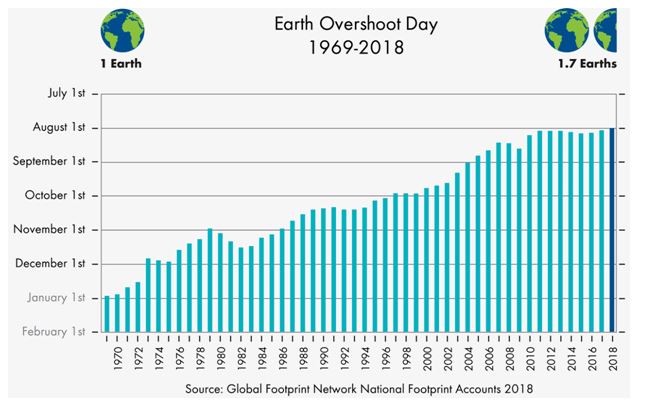
Figure 2 – Earth Overshoot Day by year since 1969. Source: Earth overshoot day.
President Trump and President Bolsonaro (with his plan to exploit the Amazon[20]) are the antitheses of these concerns. But their (and others’) existence are calling the polar opposite into existence as opposition. Germany may be showing the way here, where the rise of the AfD (a nationalist right-wing group) is catapulting the Greens to becoming the largest opposition party, thus replacing the Social Democrats[21]…
This is an excerpt from the GEAB No 129 /Nov 2018. Read the bulletin in full
__________________________________
[1] Source: Francis Fukushima, “The End of History and the Last Man”, 1992, the Free Press.
[2] For a short summary of the Spencer/Carlyle debate, see Wikipedia
[3] Sam Meredith, “Worldwide inequality has risen in nearly every region since 1980, study says”. Source: CNBC, 14 /12/2017
[4] Thomas Piketty, “Capital in the Twenty-First Century”, Harvard University Press, April 2014
[5] Georges Abi-Heila, “The American Dream is Dead”. Source: The Medium, 04/05/2018
[6] OECD to launch new PISA report on equity in education on Tuesday 23 October 2018. Source: OECD, 23/10/2018
[7] For a considered picture of this, read Eduardo Porter and Karl Russel, “Migrants Are on the Rise Around the World, and Myths About Them Are Shaping Attitudes”. Source: The New York Times20/06/2018
[8] Oliver Bullough, “Crashed by Adam Tooze review – a masterful account of the financial crisis”. Source: The Guardian, 26/09/2018
[9] Political elites: Does perception meet reality? Source: Euractiv, 09/10/2013
[10] Kira Pelkoff, “Anti-Aging Pioneer Aubrey de Grey: ‘People in Middle Age Now Have a Fair Chance’”. Source: Leapsmag, 30/01/2018
[11] For an interesting take on how our calling this the Anthropocene is actually an act of hubris, see: Alton C. Thompson, “So This is The Anthropocene? Or, Rather, is Our Hubris Showing?”. Source: Nature Bats Last, 20/01/2015
[13] Nassim Nicholas Taleb, “The Black Swan” April 2007, Random House.
[14] Steve Lohr, “Stress Tests for the Global Supply Chain”. Source: New York Times, 19/03/2011
[15] “US tariffs: Steel and Aluminium levies slapped on key allies”. Source: BBC, 31/05/2018
[16] China’s coming-out party. Source: The Economist, 16/11/2006
[18] Jane Dalton, Planetary overshoot “Humans have used a year’s worth of Earth’s resources in just seven months”. Source: The Independent, 24/07/2018
[19] Josh Gabbatiss, “All UK mussels contain plastic and other contaminants, study finds”. Source: The Independent, 08/06/2018
[20] “Bolsonaro plans threaten Amazon, say experts”. Source: BBC, 31/10/2018
[21] Hedda Nier, (Title Translated) “The greens on the way to becoming a people’s party”. Source: Statista, 05/11/2018


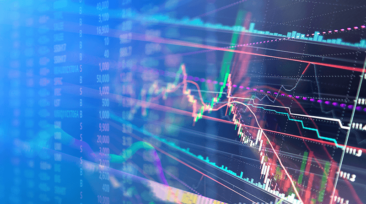
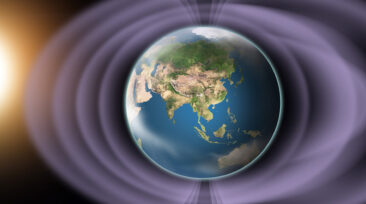
Comments